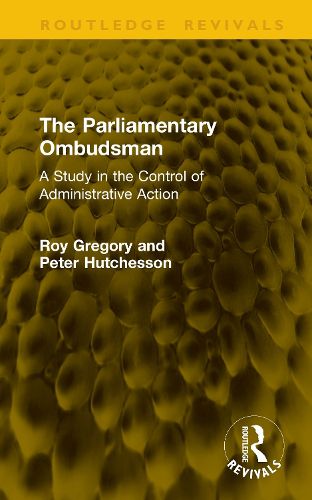Readings Newsletter
Become a Readings Member to make your shopping experience even easier.
Sign in or sign up for free!
You’re not far away from qualifying for FREE standard shipping within Australia
You’ve qualified for FREE standard shipping within Australia
The cart is loading…






In the late 1950s the term 'Ombudsman' was familiar only to specialists in the government of Scandinavian countries. Since then, the institution has spread throughout both the Western and developing worlds. With the appointment of the Parliamentary Commission for Administration in 1967, the United Kingdom adopted its own special version of the Ombudsman. Originally published in 1975, the role of this new office, and the manner in which it operates, is the central theme of this major study by Roy Gregory and Peter Hutchesson for the Royal Institute of Public Administration.
The book was the first comprehensive account of the scope and workings of the Parliamentary Commissioner scheme. It would undoubtedly have been of great value not only to students of British government, but to all those who may have had occasion to make use of the Commissioner's services at the time.
The authors discuss the problem of maintaining adequate control over administrative action, examine the origins and adoption of the Parliamentary Commissioner system in the United Kingdom and set out the principles upon which it is based. The core of the book is devoted, however, to the internal organisation and working methods of the office itself, and to a careful analysis of the Commissioner's rulings on jurisdictional questions, his findings in relation to the key concept of maladministration, and his efforts to secure remedies for injustice caused by such faulty administration. A detailed case-study of the celebrated Sachsenhausen affair illustrates some of the issues discussed elsewhere in the book.
The office of Parliamentary Commissioner emerges from this study as a unique institution, drawing its inspiration from the Scandinavian model, but designed primarily to strengthen the existing apparatus of parliamentary control over central administration. As the book shows, with an important ally in the associated Select Committee of the House of Commons, the office has gone a long way towards fulfilling this objective, besides paving the way for recent extensions of the Ombudsman principle to other areas of public administration.
$9.00 standard shipping within Australia
FREE standard shipping within Australia for orders over $100.00
Express & International shipping calculated at checkout
In the late 1950s the term 'Ombudsman' was familiar only to specialists in the government of Scandinavian countries. Since then, the institution has spread throughout both the Western and developing worlds. With the appointment of the Parliamentary Commission for Administration in 1967, the United Kingdom adopted its own special version of the Ombudsman. Originally published in 1975, the role of this new office, and the manner in which it operates, is the central theme of this major study by Roy Gregory and Peter Hutchesson for the Royal Institute of Public Administration.
The book was the first comprehensive account of the scope and workings of the Parliamentary Commissioner scheme. It would undoubtedly have been of great value not only to students of British government, but to all those who may have had occasion to make use of the Commissioner's services at the time.
The authors discuss the problem of maintaining adequate control over administrative action, examine the origins and adoption of the Parliamentary Commissioner system in the United Kingdom and set out the principles upon which it is based. The core of the book is devoted, however, to the internal organisation and working methods of the office itself, and to a careful analysis of the Commissioner's rulings on jurisdictional questions, his findings in relation to the key concept of maladministration, and his efforts to secure remedies for injustice caused by such faulty administration. A detailed case-study of the celebrated Sachsenhausen affair illustrates some of the issues discussed elsewhere in the book.
The office of Parliamentary Commissioner emerges from this study as a unique institution, drawing its inspiration from the Scandinavian model, but designed primarily to strengthen the existing apparatus of parliamentary control over central administration. As the book shows, with an important ally in the associated Select Committee of the House of Commons, the office has gone a long way towards fulfilling this objective, besides paving the way for recent extensions of the Ombudsman principle to other areas of public administration.